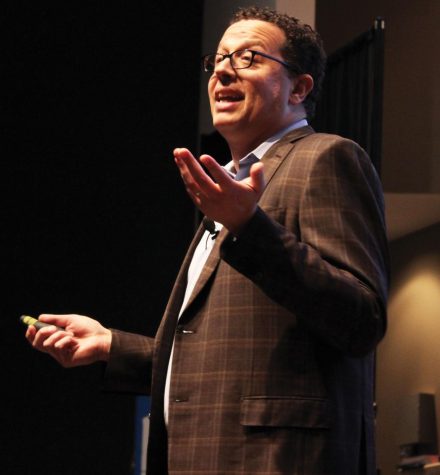Speaker says talk to parents about money
Don’t invest in material things, spend money on experiences
May 10, 2018
You are entitled to ask your parents how much money they make. At least that is what New York Times columnist Ron Lieber thinks.

THE OPPOSITE OF SPOILED. New York Times Columnist Ron Lieber presents to the Parents’ Association on April 23. Mr. Lieber wanted to convince parents to have a more open and honest conversation about money to give it the respect it deserves.
In his book, “The Opposite of Spoiled,” he discusses how to have conversation with children about money in an effort to raise children who are not “spoiled.” Mr. Lieber spoke about his book to the Lab Schools Parents’ Association on April 23.
The book focuses on how to teach children how to think monetarily, and how to not be indulgent with with purchases or long-term decisions related with money. Although his book covers kids of all ages, he believes that there is a specific importance of his work for teenagers.
The rising Senior Class faces the lengthy and strenuous college process, a tiring and stressful experience. In addition to the emotional turmoil caused by this process, a large monetary package goes along with deciding a college. On average, private school tuition was about $35,000 for the past school year, and $26,000 for out-of-state public school applicants.
I actually think that by the time you are a junior or a senior you ought to know how much money your parents make because, you know, you’re getting ready to make these enormous decisions about college and perhaps how much debt to take on and maybe what you want to study.
— Ron Lieber, New York Times columnist
“I actually think that by the time you are a junior or a senior you ought to know how much money your parents make because, you know, you’re getting ready to make these enormous decisions about college and perhaps how much debt to take on and maybe what you want to study,” Mr. Lieber said in an interview with the Midway.
Even without the challenge of college applications, Mr. Lieber argues that teenagers must have conversations about money. He explained that since many students at U-High are financially fortunate, they have the luxury to choose whether they want to discuss money, even though he argues against this. On the other hand, less well-to-do families might need to discuss how to save their earnings every day.
However, he explained that if parents want to raise children who will become financially savvy adults, they should openly discuss their financial situation with them. In this way, he believes that the values individuals have about their lifestyle can be carried into their monetary choices. In his book, he delves into everyday situations in order to give parents a clearer idea of how to raise kids in this way.
Mr. Lieber explained that the goal of his talk with the Parents’ Association “was basically trying to convince all of your parents to talk to you more openly and honestly about money, about their money, about your money, about money in the world and to treat money with the important and respect that it deserves.”

















